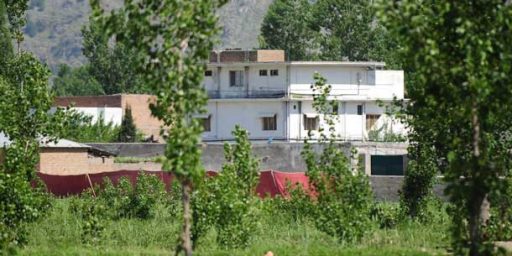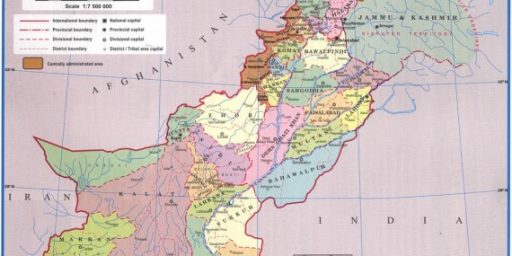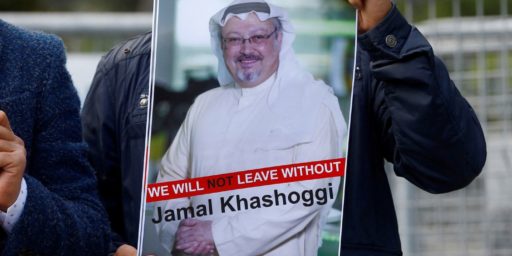WITH FRIENDS LIKE THESE. . .
Max Boot makes an interesting point:
TO JUDGE by Libya’s promise to give up its weapons of mass destruction, President Bush’s get-tough approach in Iraq and Afghanistan has impressed our enemies. But what about our ostensible allies?
Pakistan and Saudi Arabia profess to be cooperating in the war on terror, yet they have done a lot more than Libya to spread terrorism and weapons of mass murder around the world. And, unlike Moammar Kadafi, they have no reason to fear a visit from the 3rd Infantry Division if they don’t mend their ways. After all, the United States doesn’t invade its “friends,” right? But with friends like these . . .
Both the Washington Post and the New York Times have published investigative articles showing that Pakistan was probably a prime supplier of nuclear technology to Iran. This is quite plausible given the well-documented links between Pakistan and another member of the “axis of evil”–North Korea. Last year, U.S. spy satellites photographed a Pakistani cargo plane in North Korea loading missile parts. There is widespread suspicion that, in return for this technology, Pakistan shared nuclear know-how with Pyongyang.
Meanwhile, parts of the Pakistani government continue to aid the Taliban insurgency against the U.S.-backed government of Afghanistan. Supposedly outlawed extremist groups like Jaish-e-Mohammed and Lashkar-e-Taiba are allowed to openly raise money and spread incendiary propaganda.
Saudi Arabia is equally complicit in helping our enemies. The Saudi government spends billions of dollars supporting madrasas, or Koranic schools, and mosques around the world that preach a virulently anti-American strain of Islam. These institutions churn out jihadists faster than Delta Force can hunt them down, not only in Saudi Arabia but also in places like Pakistan.
Abd al Aziz bin Issa, a leading Al Qaeda member, recently called Saudi Arabia “the primary source of funds for most jihad movements.”
***
The superficially reassuring thing about Saudi Arabia and Pakistan is that the leaders of both countries, Crown Prince Abdullah and President Pervez Musharraf, have disassociated themselves from such extremist rhetoric. Both claim to be allies in the war on terror–and to some extent they have delivered by detaining some suspects and closing some bank accounts. But neither one has done nearly enough to crack down on the extremists who have penetrated their own governments.
The problem, of course, is that both regimes have a very tenuous grip on power. The terrorists have a lot more support than the governments in both Pakistan and Saudi Arabia. I’m not sure we’re not better off with half a loaf–governments that support our goals but take very little public action to help us achieve them–than the likely alternative. We’ve chosen to fight the first rounds of this war in Afghanistan and Iraq and have to stage somewhere; we can’t fight everywhere at once. If we can clean out the terrorists in those countries and create stability, we should be in a better position to get cooperation from fearful allies in the region.






“…we can’t fight everywhere at once,….”
As an erstwhile opponent of Bush and, in particular, the preemptive doctrine to fight terrorism, I still must give credit where credit is due. Weapons inspectors apparently will begin their chores in North Korea next week. Syria seems to be cooperating in the effort to clear up the “Missing Millions” mystery. Finally, the US government has made conciliatory overtures to Iran during that country’s human-disaster crisis.
The Bush apologists see this progress as successful intimidation resulting from massive bloodletting in Afghanistan and Iraq. I attribute the progress as the evolution of realpolitik within the Bush administration in conjunction with political objectives for the 2004 election.
Whatever the reason and with the dawn of 2004, let us all hope that this trend becomes reality and supplants death and destruction from terrorists and governments alike.
—